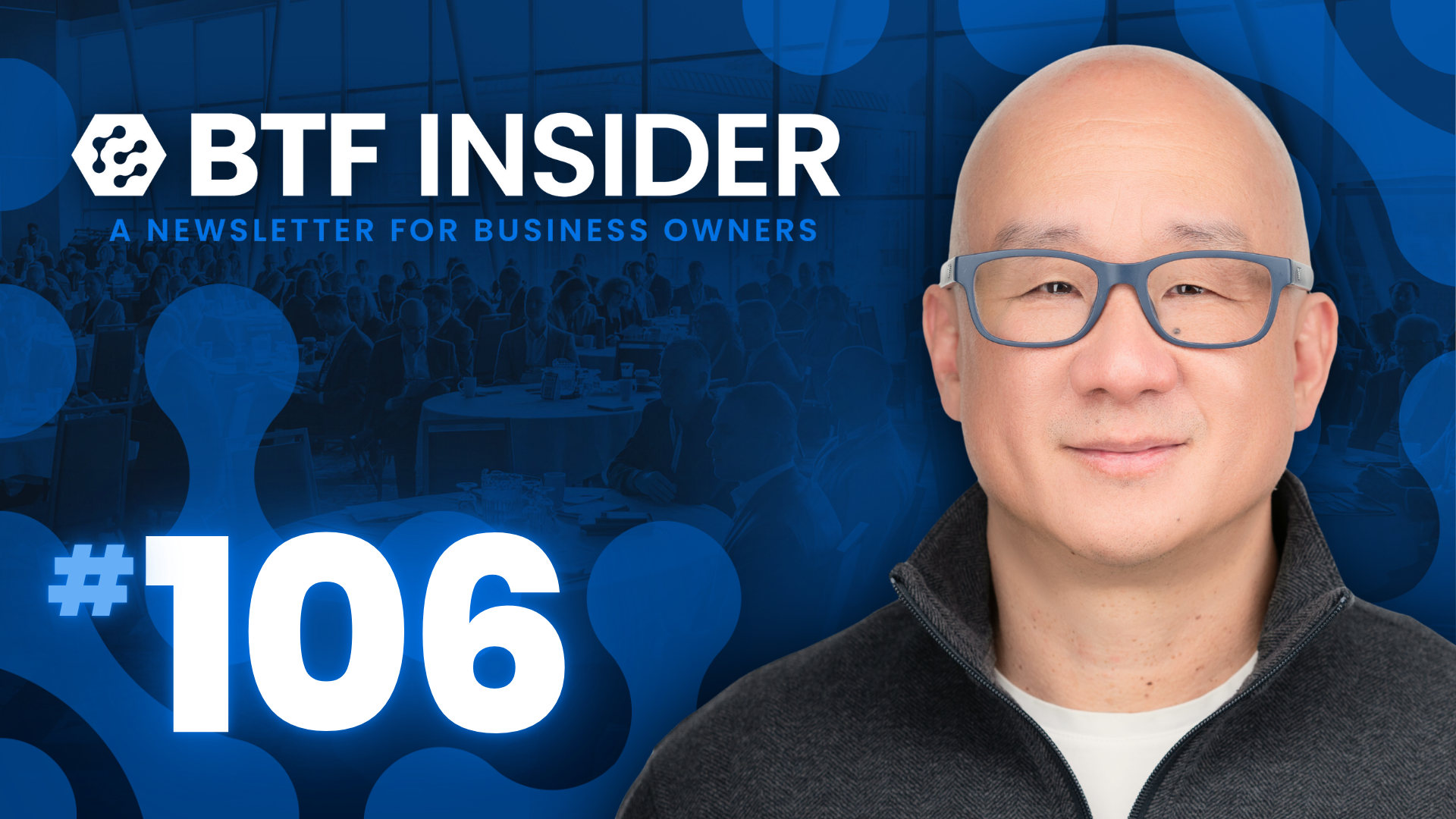Dear BTF Community,
Every owner knows that transformation is hard. But few realize that hesitation, not competition, is what quietly erodes company value.
That’s the insight Rocky Ozaki, Founder and CEO of The NoW of Work, shared when we spoke ahead of BTF Vancouver 2025.
Having spent the past decade helping established companies modernize for the digital age, Rocky sees a consistent pattern: most organizations know what needs to change but delay acting on it until the market forces their hand.
For owners planning growth, succession or sale, that hesitation can be costly. Buyers reward organizations that demonstrate adaptability, efficient execution and a culture that moves with confidence.
Key Takeaways for Business Owners:
- Hesitation destroys value. Progress belongs to companies that act decisively.
- Agility signals strength. Shorter planning cycles and adaptable cultures attract better buyers.
- Innovation isn’t just ROI. Measure learning, speed and collaboration.
- Culture drives performance. Execution and adaptability define deal value.
Enjoy,
Mark
The Real Cost Of Hesitation
Rocky’s view on transformation is simple: it’s not about knowing what to do, it’s about having the courage to start.
“I think a lot of complacency actually comes from hesitation, from a lack of courage to make a bold decision.”
That hesitation, he explains, is the quiet killer of enterprise value.
Markets move faster than most leadership teams do. The longer an organization waits to adopt new tools, streamline workflows or experiment with emerging technology like AI, the more its competitive position (and valuation) slips.
For Rocky, motion itself is a leadership skill.
“Start before you feel ready,” Rocky says. “The lesson will come after the leap.”
Innovation Beyond ROI
Rocky challenges a deeply rooted assumption: that innovation must justify itself through traditional ROI.
“One of the greatest impediments to innovation is often the traditional CFO mindset. Because if they’re constantly asking you for ROI and focusing on sunk costs, you might not take chances on innovative endeavours”
He uses the term innovation accounting to describe a broader way of measuring adaptability. Metrics like:
- How many ideas are being tested.
- How quickly a concept moves from idea to prototype.
- What teams learn from failure.
- How cultural capability improves with each experiment.
- Problem-solution fit.
“Innovation isn’t about the size of your bets,” he says. “It’s about finding and solving real problems, and even how quickly you fail and learn from experiments.”
For business owners, this mindset matters.
In the context of a potential sale or transition, buyers aren’t only analyzing margins, they’re assessing whether the company can continue to innovate under new ownership.
When Culture Becomes The Constraint
Rocky’s corporate innovation work has revealed something most leaders underestimate: culture can either accelerate or completely block change.
“You don’t know what you don’t know… Most corporations have significant challenges with execution.”
To drive the point home, he’s even dropped enterprise executives into startup environments for a day, an experiment that exposes the difference between talking about innovation and actually living it.
“They quickly realize the gap in mindset, pace, and courage,” he recalls. “They understand how slow they’ve become.”
That experience underscores a central truth: companies that foster lifelong learning, democratize innovation and are relentless with accountability move faster and build value faster. Those that cling to comfort lose both momentum and talent.
The Divide Is Growing
Rocky believes we’re entering a defining moment for business owners.
“The companies that are leading the way, the first movers and fast followers, they’re likely going to continue to distance themselves from the rest of the market; and it’s happening fast.”
He calls it the exponential divide, the widening gap between organizations capable of adapting in real time and those that continue to operate linearly, with an old industrial age operational mindset.
From his early days (2013) working in Vancouver’s tech startup ecosystem, Rocky has watched once-radical practices (cloud storage, remote work, design thinking, hackathons, Slack (IM), Zoom, OKRs, Agile) become standard operating procedures. What was innovative then is now simply how high-performing businesses run; regardless of industry or company size.
“Every company today must operate like a tech company. They have to be innovative, they have to be agile, they have to be human-centered.”
Final Reflection
Rocky Ozaki’s perspective isn’t about chasing the latest technology trend; it’s about building organizations that can evolve as fast as their environment changes.
For business owners that capability is strategic, and adaptable companies will attract stronger buyers, maintain higher valuations and handle transition with far less disruption.
And as Rocky reminded us at BTF Vancouver, the mindset that powers modern leadership is about more than predictability, it’s about preparation.
The businesses that learn, adapt and execute with intent are the ones that will define the next era of ownership.



